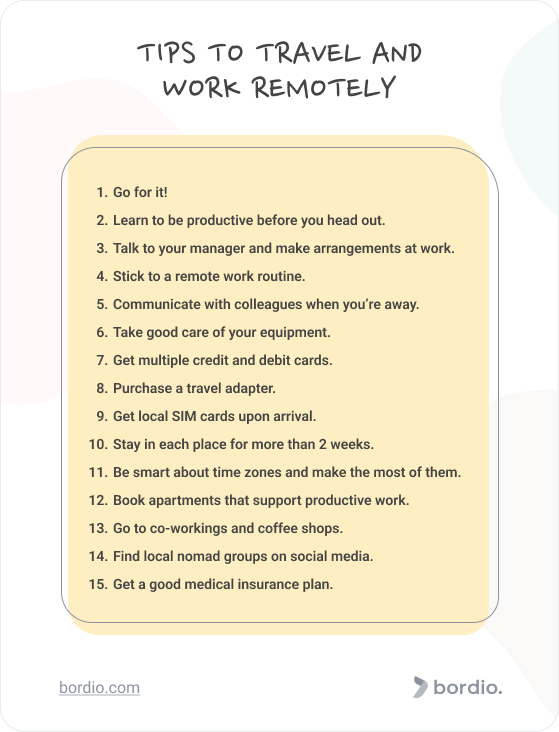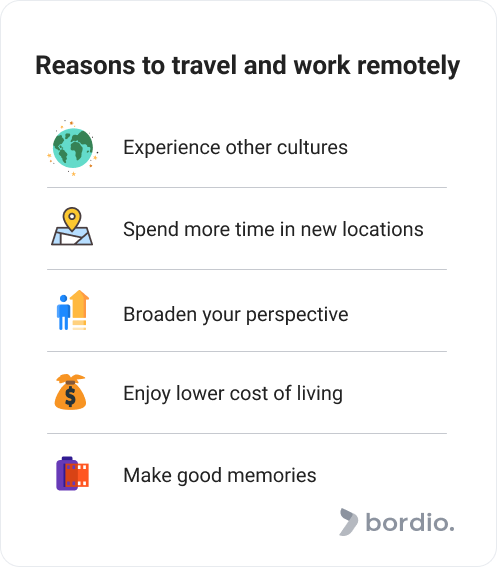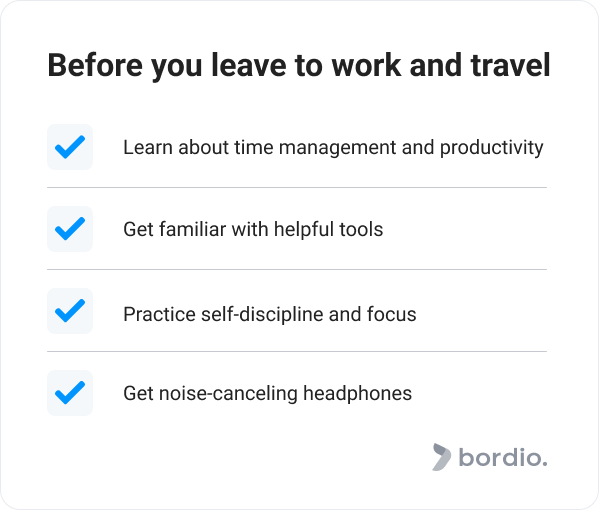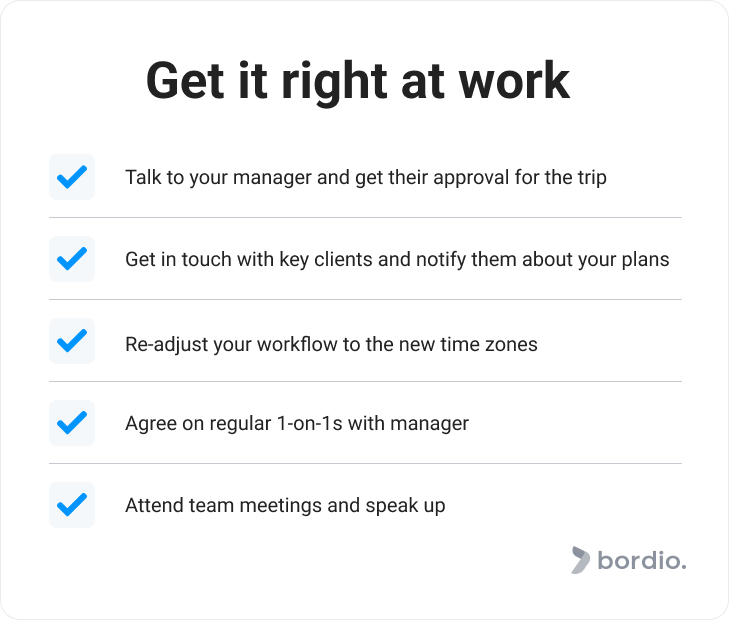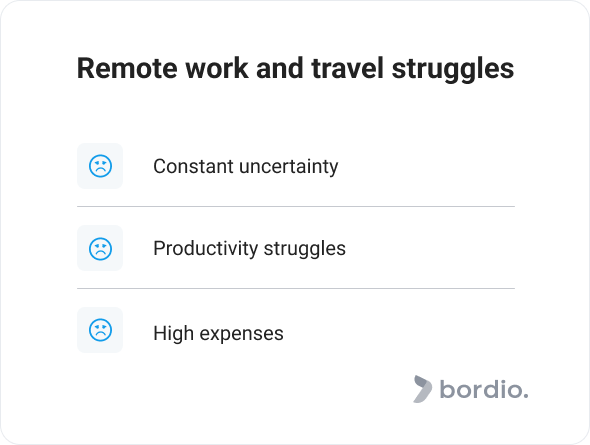Ever since the pandemic, working remotely has stopped being something reserved exclusively for freelancers and the IT sector, and became widely available to the general public. And as we are now (hopefully) ending the restrictions phase, and traveling becomes an option again, many professionals are considering turning into digital nomads, working remotely, using remote team software and traveling the world.
But don’t start daydreaming about sipping mojitos with your laptop in one of Bali beach clubs just yet! Working and traveling can seem glamorous but it’s a lot of work. Literally.
You should consider many factors before embarking on such a journey, and it’s best to be prepared. We created a list of tips for you to make the most of the remote work adventure and avoid the common mishaps that inexperienced digital nomads have to deal with.
Why work remotely and travel?
If you are reading this article, you are probably already convinced that traveling and working are worth it, or at least you are seriously considering this possibility.
For anyone who has doubts, here is a nonrestrictive list of reasons why you might opt for working remotely and use remote working collaboration tools while traveling.
You get to experience many places and soak up the culture
The world is very big and different, but our time on the planet Earth is limited.
Unless you are a duke with an impressive inheritance, you are likely to need to work to support yourself. And if you are in the US, Japan, or other regions with limited vacation days, your chances of traveling around the world become even slimmer.
Working remotely allows us to make the best of two worlds. You get to continue providing for yourself during your working hours, and the rest of the time can be dedicated to exploring the city, meeting new people, and learning about other cultures.
Spend more time in locations than you would be able to as a tourist
Even those lucky citizens of Northern Europe with 5 -6 weeks of vacation can’t spend three months in Madrid unless they have a remote job or are being sent there on a business trip.
Remote workers get to morph into locals and really learn what it’s like to live in a place they are visiting. They have more time to explore and feel the local life. Put in your perfect online planner what places you want to visit so you don’t forget or miss anything.
Broaden your understanding of how the world works in different places
If you’ve lived in London your entire life, and then travel to Vietnam for 10 days, you are likely to be shocked by the staggering difference between the UK and Vietnamese lifestyles.
Yet, as you come to the country as a tourist, you only get to see and experience the surface level. Remote working allows digital nomads to get a profound understanding of not just the culture, but the mundane everyday events.
And being able to see everything from different perspectives makes us more compassionate in personal relationships, and also better professionals who can think outside of the box and negotiate with different people successfully. Having a broad outlook will help you in the future when you need to deal with different problems in life – so this is a useful skill along with knowing languages and keeping a simple schedule builder.
Enjoy the lower cost of living and save money
If you live in places like Canada, Norway, or Switzerland, you know too well how expensive life can get.
A programmer from California who makes 250K annually will have radically different possibilities in countries where the cost of living is lower. Properly spread your finances using free weekly schedule maker. Working remotely can be your key to saving up for a house, having more spare money to invest, or building up an impressive emergency fund.
Have something to remember as you get old
Last but not least – if you work remotely for a while and travel the world, you will have that experience with you forever.
Many digital nomads say that one of their main reasons to switch to this lifestyle is because they don’t want to wake up at 95 and realize they’ve not done anything adventurous or interesting so plan your time well.
What to consider when working remotely and traveling
We’ve searched far and wide, looked back at our past experiences, and came up with an extensive list of tips that should make your experience much easier if you follow them.
Tip 1: Go for it!
Okay, we have to start with this one because many people hesitate for years before they take the leap.
You only live once, and if your work allows you to travel the world, then we don’t see any reason big enough to stop you. After all, you can always come back home early if you don’t enjoy it, right?
The founder of Bordio, Jacob Udodov, had his first remote work experience in 2018 when he traveled for 5 long months throughout the whole of Asia, and worked remotely from Thailand, Malaysia, Singapore, Indonesia, Philippines, Hong Kong, and China. To this day, Jacob remembers this as a great adventure that was not easy to decide on, but the one he feels zero regrets about.
Tip 2: Practice productivity hacks and self-discipline rituals before you leave
Imagine arriving in Paris and checking into your beautiful Airbnb. And then imagine having to open your laptop and start working immediately. Yikes! That’s, however, the reality of digital nomads, and it will be yours too.
Needless to say, it can be quite hard to concentrate on that excel sheet with the Eiffel tower peeking through your window.
To make it easier for yourself, learn about time management and productivity tips that will help you remain a productive digital nomad anywhere you go.
Get yourself a helpful tool to manage all your tasks and work, such as Bordio’s free online calendar planner – keep all your to-do lists in one place, use Kanban boards, share your schedule with the team, and enjoy top productivity. Bordio allows you to work remotely and manage multiple projects at a time, and remain sane in the chaos of digital nomad life.
Bonus tip: Purchase noise-canceling headphones to help you stay focused if your surroundings get noisy. Even if you choose to work at home, your backyard can get loud or your foreign neighbor may choose to renovate their apartment just when you need to focus on the monthly report.
Tip 3: Talk to your boss and clients and set boundaries
Your working hours, the apps you’ll use for work and reporting, the best way to contact you – all that needs to be agreed on.
If you’re moving to a drastically different time zone, then you just might have to put up with late-night video calls and painfully early meetings. However, it makes sense to chat with your manager and clients and see how you can make it work so that everyone is satisfied.
And, naturally, before you even start planning your trip, make sure your plans comply with HR rules and are okay with management.
Bonus tip 1: Agree on regular 1-on-1 meetings with your manager to get updates, report your progress, and stay visible even when you’re away. Also, don’t forget to attend team meetings and always speak up during daily stand-up check-ins.
Bonus tip 2: If you somehow miss a deadline or make a mistake when you travel, make sure you read our guide for apologizing to your manager and use it when addressing the issue.
Tip 4: Stick to a remote work routine
Before you leave, think about your top priorities and goals. Look at your short and long-term project, review the online to-do list in your task organizing app, and make a plan in your free virtual planner. It’s easier to stay productive and accomplish your goals when they’re clear to you.
Avoid waking up 4 minutes before the work day at all costs. It’s okay to do it sometimes, but not every day! And it’s a slippery slope too.
Also, maintain a remote work schedule and have a solid weekend off, even if it’s on Monday and Tuesday for you. Blurring the line between work and rest leads to burnout quicker than you think.
Lastly, set a limit for how much you work on a given day, and don’t be shy to turn your laptop off when the time is up.
Bonus tip: If you can, replicate your usual routine as much as you can to reduce stress and adapt to new environments faster. So much is already changing around you, if the routine can stay the same, then keep it, and don’t invent the wheel once again.
Tip 5: Stay present and make it a priority to communicate
When you don’t have the luxury of sharing an office or a city with your colleagues and co-workers, you might feel left out and they might feel like you’re not fully there either.
It’s a tricky situation that is best solved with communication. Make sure you catch up with everyone regularly and, if you can, always turn on your camera on conference calls. We understand that you won’t always want to do that, but trust us, it makes a world of a difference. If your time zones are way too crazy for catch-up calls and chatting, resort to asynchronous communication.
Bonus tip: If you feel that team meetings are becoming stale, check out our list of Zoom ice breakers and implement them to add a bit of fun.
Tip 6: Take good care of your equipment
Depending on your location of choice, getting a new laptop would be more or less problematic. Still, let’s try to avoid that situation altogether. Losing your precious laptop when you’re away is painful. Starting with lost data and working downtime to the extra expense that nobody needs.
As you’re working and traveling, invest in a good backpack that will fit your computer and things like a hard drive that you need to get work done. It also makes sense to get a laptop sleeve for extra protection.
Tip 7: Get several debit and credit cards
Your bank cards can be lost, stolen, or chewed up by the ATM. Those things happen, even if you deem yourself lucky and careful. The extra cost of additional credit cards is far less than losing all your money somewhere in Latin America.
Tip 8: Get a travel adapter
Best to do it before you embark on your journey. Travel adapters are pretty small, so you should not have too much trouble fitting them into your luggage. And it’s much better to have the inconvenience of an extra piece in your suitcase than find yourself with a dying laptop battery on a remote villa with no charging options.
Trust us, many stubborn digital nomads have suffered from this before. You don’t need to add to the statistic.
Tip 9: Get local SIM cards
Mobile data in roaming gets so expensive that even Jeff Bezos wouldn’t want to use it.
Get yourself a local SIM card to order food delivery and use taxi services, make calls if and when you need, and, most importantly, have 24/7 internet access in case your workplace of choice has weak wi-fi or you decide to make a quick run to the museum during the work day.
Also, having a local SIM is a matter of safety – you can reach emergency services if needed, and your friends and family can reach you too.
Bonus tip: Make sure your phone is unlocked if you decide to get a local SIM card. Best to check with your provider before you leave.
Tip 10: Stay in each location for longer than two weeks
It’s best to stay longer in each location, especially if you intend to work and travel remotely for a long time. It takes time to get acclimated, establish a routine, and start feeling like you belong. And while it’s tempting to jump from city to city every other week, it will take a toll on your productivity and energy levels. So, take it slow and thank us later.
The optimum timeframe is believed to be from 3 to 4 weeks in 1 location, just like a Scrum sprint!
Tip 11: Think about the time zones
Consider different time zones and decide when you’re going to work and when to rest.
If you go to the east and stay in Thailand or Bali, you will have to start your work later than usual. So, if a big part of your digital nomad dream is surfing, you can spend your morning enjoying your life on the beach, and start working in the afternoon when it’s morning in your home country.
Tip 12: Be smart about apartment booking
Whenever you book an apartment, make sure it has a desk where you will be able to work remotely. Airbnb is full of tiny homes with small tables that might not be able to accommodate your equipment.
Also, always check the internet connection before booking an apartment. You can message the host and ask them about the average internet speed. Don’t be afraid to appear pushy or arrogant, hosts are used to such queries and they’ll be able to provide you with the needed information. If you risk it and ignore the internet question, you can find yourself stuck in a small room with literally no WiFi and no chance of getting your deposit back.
From our experience, the internet is usually better in apartments than in hotel rooms, but that varies greatly depending on the country and even the city.
Tip 13: Take advantage of shared co-working spaces and coffee shops
If you rent a nice hotel room or an apartment with a desk and a coffee machine, you might think that it’s not smart to go out somewhere, spending money and commuting while you can just as well work from the comfort of your home.
But if you are traveling solo, and nobody sees you during your work hours, you are more likely to procrastinate and fall victim to distractions. When in public, especially in a co-working space where others are somewhat productive, you are much more inclined to get through your to-do list for the day. Plus, you’d be far less likely to turn on Netflix and binge-watch a season of something random if you’re surrounded by people with laptops who are working away.
You don’t have to go out to work every single day, especially if your self-discipline is well-developed. However, you can kill two birds with one stone if you decide to work somewhere else. You’ll get an extra accountability boost and you’ll feel less lonely which, we’re not gonna lie, sometimes happens when you’re traveling long-term on your own. And who knows, you might meet some like-minded people there and make new friends or even potential partners!
Finding good coffee shops with wifi is rather easy – you can ask around, check Foursquare and Instagram, walk around and bump into one. It’s a bit different with coworking spaces though. You’ll hardly find many locals who know about those, so here are a few recommendations for you:
- Nomadlist is a great online community with all kinds of insights for nomads, plus they have tons of coworking recommendations.
- Workfrom is another handy portal with lots of recommendations and cool filter options, such as ‘not too loud’ to help you find the right co-working space for your needs.
- Breather is an on-demand booking service for desks, meeting rooms, and any other workplaces that you can use to find a spot quickly if you’ve got a last-minute request for a call with a client that requires absolute silence.
When going to a co-working space, always check if they have special offers for first-timers. Chances are, you’ll be able to get a hefty discount or even a free trial day at some of the places.
If you choose to work from a coffee shop, here are some ground rules for good karma and productivity:
- Check opening hours before you go. Yes, this is a very obvious recommendation but we wouldn’t share it if lots of digital nomads (us included) weren’t making this mistake.
- Always order something to eat or drink. It’s common courtesy in any case, but especially if you’re looking to spend a few hours in this place. Some say you should order a drink or a snack every hour, but we’ll leave it to you to decide.
- Don’t be shy about looking around before sitting down. It’s best to choose the seat that will be comfortable for long-term work, so maybe something not on the way, with a chair that won’t kill your back, and with an outlet nearby.
- Also, don’t be shy to look around and leave if there are no spaces or you don’t like what you see. You shouldn’t feel bad because no one truly cares.
- If you’ve managed to score a seat near the outlet – plug your computer in even if you’re at 100% now. You never know when you’ll need to leave and if the new spot will have an outlet too. Better safe than sorry. And please, please, please – be considerate when using an outlet. Don’t stretch it across the way and make it an issue for everyone in the building.
And last but not least, remember the basic etiquette:
- Be friendly and say hi to the neighbors when sitting down.
- Do small talk but don’t distract others.
- Don’t make loud slurping noises with your drink.
- Turn off the sound on your phone and make sure it’s not constantly vibrating on the table.
- Don’t click your pen to death, shake your leg or make other repetitive actions that can be disturbing or annoying to other remote workers.
Tip 14: Look for local digital nomad groups on Facebook and other apps
Besides useful tips and lifehacks, Facebook groups offer a platform to meet new friends and learn about the cool areas and spots in the city that you would otherwise miss. And if you run into an issue – chances are someone else has experienced that before, so ask away in those groups.
Tip 15: Invest in a good medical insurance plan
Nobody wants to think about health issues and negative scenarios, but it’s really important to leave your home prepared.
Did you know that healthcare in Bali is crazy expensive and they won’t admit you to the hospital, no matter the severity of your health problem before you prove you can pay?
Yep. It’s really that bad, so if you don’t want to add more stress to an already difficult situation, have international health insurance with you with extensive coverage. Oh, and also we’d recommend having an emergency fund set up for all kinds of situations, including health issues.
Also, note that many insurances have a limited number of days that you can stay abroad in a row (say, 90 days) before it gets invalid.
Potential downsides of working remotely and traveling
We thought we’d quickly share some of the potential cons of working remotely and living in different places. It’s only fair to know about both good and bad, right?
Uncertainty
Uncertainty is constant and at all times high. As a digital nomad, you never really know what you’re getting yourself into until you arrive, check in to the apartment, and start the remote work. So, if unpredictability gives you stress, this is your trigger warning.
Struggles with productivity
Your productivity might drop and it will be hard to put it back up with so much going on in your life.
Imagine arriving in Barcelona on a Sunday night and having to hustle all day on Monday? Many remote workers risk missing their deadlines because they just can’t work for the first few days as they move locations.
Tip: If you feel like you are in the risk zone with productivity, get yourself prepared before you leave. Read productivity books to get inspired, learn about new techniques, sign up for a free daily planner, and practice them. If you don’t have time to read books, the internet is full of articles with productivity tips and time management advice.
Expenses
You can budget for a remote work trip and make it work but you have to be extra diligent.
There are so many temptations when you are abroad, so much food you’d like to try and nice clothes that they don’t sell back at your home that you must have right now. If you are not careful, you can easily spend your entire paycheck on non-essential things and even incur debt.
Housing is another aspect that tends to bite off big chunks of your salary. And if you are paying a mortgage or keeping your lease while you’re gone, you will be paying for two locations and only living at one. It means that your disposable income will be much lower than you’re used to.
Final thoughts
We hope that this guide has proven useful to you and that our tips will make your digital nomad life a little less stressful.
Before we sign off, we want to focus on the best two tips we can ever share with remote workers that are:
- Be a decent human being and stay courteous to people around you.
- Invest in your equipment as it will pay off in the long run and will keep you from unnecessary trouble.
If you remember nothing else from this article, remember those two remote work tips and we are sure you’ll be fine wherever life brings you. Working remotely while traveling is possible, and we hope you will experience the digital nomad lifestyle, even if you don’t do a remote year and only go for a few months. Do not forget to try out time organizers and task makers so sign up for Bordio’s week planner before you go – and make the most of the adventure!

